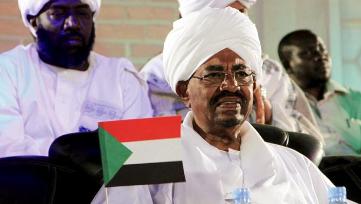Sudan’s NCP rejects attempts to transfer dialogue abroad
May 9, 2015 (KHARTOUM) – The ruling National Congress Party (NCP) reiterated its rejection for attempts to hold the national dialogue process outside the country and urged to stop foreign interventions in the inter-Sudanese process.

In a letter to the African Union leadership on 3 April, the opposition alliance called for a greater international involvement and suggested that the mediation and the AU Peace and Security body work closely with the UN Security Council and other international actors.
The national dialogue coordination body known as (7+7) committee held on Saturday its first meeting since the end of electoral process last month. The participants renewed calls for the opposition forces to join the political process and announced they would meet the president Omer al-Bashir who would determine a date to launch the internal dialogue.
Following the meeting, NCP political secretary Mustafa Osman Ismail said the participants stressed their commitment to all what they agreed in the past months, including the national dialogue roadmap of 9 August 2014.
Ismail stressed the 7+7’s rejection for holding any dialogue outside Sudan, saying “this national dialogue is a national process initiated by President Omer al-Bashir who tasked the political parties with determining its agenda, and there is no room to hold any dialogue abroad.”
He went further to say that the greatest impediment to the national dialogue, is the linkage of the opposition groups with external forces that want to control the dialogue and define its issues and items.
“The foreign forces have to stop interfering in the internal national dialogue,” he added.
The Troika and European Union countries questioned the credibility of the legislative and presidential elections pointing to the lack of freedoms and the continuation of armed conflicts in the country.
They also pointed to the government failure to hold the national dialogue during more than a year since its launch by president Bashir in January 2014.
The Popular Congress Party (PCP) representative at the 7+7 meeting, Kamal Omer, reiterated the rejection of his party to external intervention in the internal process.
Regarding the PCP refusal to participate in the pre-dialogue party on 30-31 March in Addis Ababa, Omer said they declined the invitation of the African Union mediation team because it raises new issues and includes new personalities in a way to fully discard the internal dialogue.
Based on the outcome of the 2005 peace agreement brokered by the IGAD and American administration which led to the secession of South Sudan, Sudanese government and several opposition parties refuse to involve the international community in the dialogue process.
However, the opposition forces including the National Umma Party say Khartoum is not serious in its efforts for a just peace and democratic reforms, adding that regional and international actors can help to pressurise Khartoum to implement the outcome of this process.
Observers say, through the involvement of the international community, the opposition intends also to obstruct Khartoum efforts to normalise relations with western countries. They further warn that any disunity or failure in the ranks of Sudan Call forces will lead to a different result.
The government says ready to participate in the pre-dialogue meeting after the sworn-in ceremony of president al-Bashir. But Khartoum is expect to seek reviewing the participation of civil society groups and the representatives of some political forces.
Also the international community seems divided over the AUHIP-led mediation as some call to rethink the whole process.
(ST)
